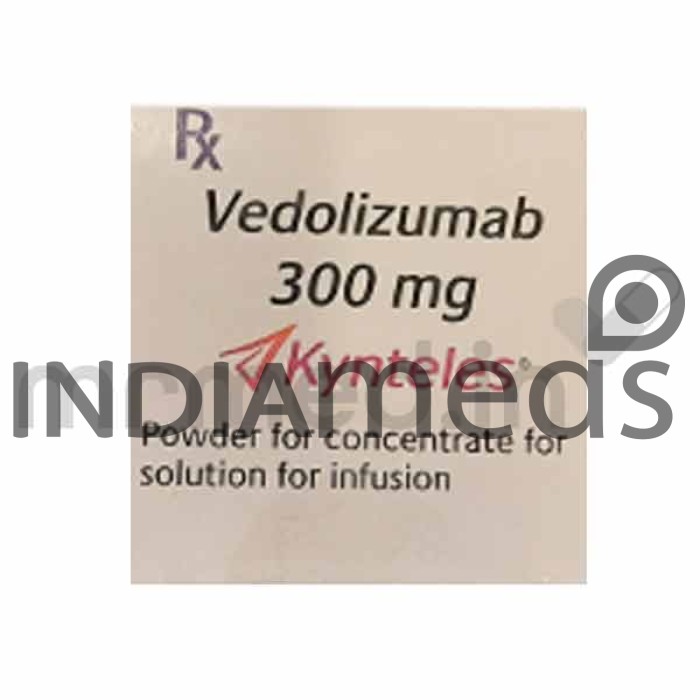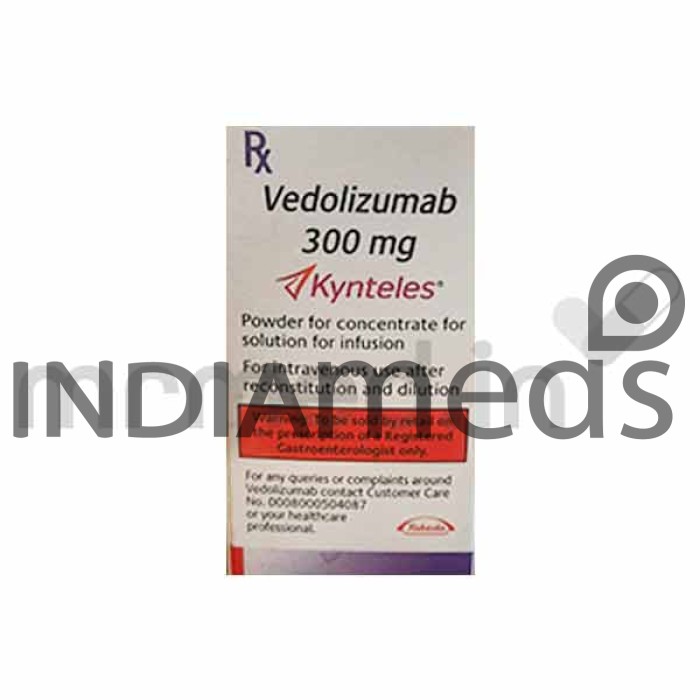Kynteles 300mg injection contains the active component of vedolizumab, which belongs to the group of biological medicines known as monoclonal antibodies (MAbs). It is used as a treatment option for adults dealing with moderate to severe cases of ulcerative colitis (inflammation of the large bowel), crohn's disease (inflammation affecting the digestive system), and chronic pouchitis (inflammation of the lining of a pouch created during surgery to treat ulcerative colitis). In these three conditions, your initial course of treatment will typically involve other medications. If you do not respond well to them or experience intolerable side effects, your doctor may prescribe kynteles 300mg injection to help alleviate the signs and symptoms of your condition.
Do not take this medication if you are under 18 or have allergies to vedolizumab or its components. Additionally, it is essential to inform your doctor if you have an active severe infection, such as tuberculosis (TB), blood poisoning, severe diarrhoea and vomiting (gastroenteritis), or nervous system infection. Another critical point is that you should not take this medication with other biological medicines that suppress your immune system, such as natalizumab or rituximab.
Inform your healthcare provider if you plan to receive a vaccination or have recently had one. Vedolizumab may impact your response to vaccines. Always provide your doctor with a comprehensive overview of your medical history and the medications you are taking before starting this treatment. If you experience any possible side effects during or after treatment, don't hesitate to notify your doctor promptly.
- Ulcerative colitis
- Crohn's disease
- Chronic pouchitis
Therapeutic Effects of Kynteles 300mg Injection
Pregnancy
It is unknown whether this medicine is safe during pregnancy. Therefore, it is given when the benefit for the mother outweighs the risk to the foetus. Tell your doctor if you are pregnant, planning to get pregnant, or think you may be pregnant before taking this medication.
Breast Feeding
It is important to let your doctor know if you are breastfeeding or planning to breastfeed because studies suggest that kynteles 300mg injection can pass into breast milk. Your doctor will decide whether to prescribe this medication after carefully weighing the benefits against the risks to your baby.
Lungs
It is unknown whether kynteles 300mg injection is safe for patients suffering from lung disease. Inform your doctor if you have any lung disease before starting the treatment.
Liver
Kynteles 300mg injection can cause significant liver injury that may lead to fatal or the need for liver transplant in some patients. Hence, do not take this injection if you have a severe liver disorder or jaundice. Inform your doctor if you have any liver disease before starting the treatment.
Alcohol
Generally, it is recommended to avoid alcohol consumption during the treatment with kynteles 300mg injection as it can cause significant liver injury. Please consult your doctor for more advice.
Driving
Kynteles 300mg injection can cause mild dizziness during the treatment. If you feel dizzy, do not drive or use heavy machines. Check with your doctor for more advice.
Serious
- Allergic reactions - the signs may include wheezing or difficulty breathing, hives, itching of the skin, swelling, feeling sick, pain at the infusion site, redness of skin
- Serious infections - the signs may include chills, shivering, high fever, or rash.
- Progressive Multifocal Leukoencephalopathy - PML (a rare fatal opportunistic infection of the central nervous system)
- Severe liver injury
Common
- Common cold, fever, and night sweats
- Pain in joint, back, throat, or limb
- Headache and tiredness
- Infections
- Muscle cramps and weakness
- Bloated stomach
- High blood pressure
- Heartburn
- Haemorrhoids
- Eczema and acne (pimples)
Regarding the safety and effectiveness of kynteles 300mg injection, there aren't any significant differences between elderly and younger patients. However, elderly patients should still undergo close monitoring. If you ever experience symptoms suggestive of progressive multifocal leukoencephalopathy (PML), such as blurred vision, loss of vision, double vision, speech difficulties, weakness in an arm or leg, changes in your gait or balance, persistent numbness, decreased sensation, or memory issues, it is crucial to inform your healthcare provider immediately.
This injection may take up to 14 weeks to show its full effect in some patients with very active Crohn's disease. So, inform your doctor if you do not notice any improvement in your condition. Make sure to stick to your scheduled doses throughout your treatment.
No, kynteles 300mg injection should not be administered to children and adolescents under 18.
If the kynteles 300mg injection works well for you, you can expect to follow a planned treatment regimen for approximately one year. Following this initial period, your doctor will evaluate your progress to determine if the treatment is still providing benefits. If it is, you will continue with the treatment. To ensure that this medicine remains the right choice for you, schedule a review for every 12 months.
Kynteles 300mg injection can make you immunocompromised and prone to infections. Hence, to protect yourself, avoid contact with sick people and wash your hands frequently. Inform your doctor immediately if you get a fever, cold, cough, flu-like symptoms, unusual tiredness, or weakness.
The most common side effects of kynteles 300mg injection are common cold, headache, and joint pain.
Inform your doctor about any prescribed medications, over-the-counter medicines, nutritional or vitamin supplements, and herbal products you take or have taken before the treatment. Tell your healthcare provider if you take or have recently taken any other immunosuppressive medications such as natalizumab, rituximab, corticosteroids, or chemotherapy medications.
Molecule Name: Vedolizumab | Therapeutic class: Anti-inflammatory agents |
Pharmacological class: Monoclonal antibodies | Indications: Moderate to severe active infections of 1. Ulcerative colitis 2. Crohn’s disease 3. Chronic pouchitis |









